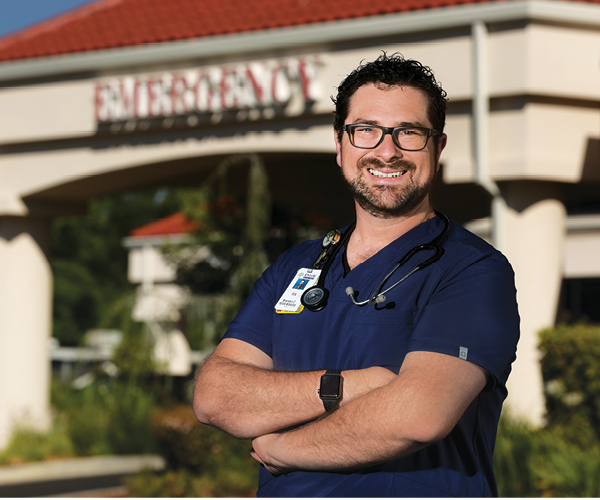
A leader emerges
Nurse discovers new role serving devastated community
As the nation’s deadliest fire in more than a century burned through Paradise, California, in November 2018, resilience was tested in unimaginable ways. For nursing student Brandon Coustette, the trial by fire taught him the first of many lessons in how to serve a community in need.
Coustette joined dozens of students from the Betty Irene Moore School of Nursing at UC Davis who put off studying for exams to go where the need was greatest. A former paramedic, he quickly jumped into action to volunteer at shelters and shelter clinics.
“At first, I thought, I’m a new nurse, I follow orders,” he explains. “But after I started working, I continued to see the impact of this disaster on our community every single day. I realized I can bring to the table the skills I learned at my school to lead. There are people in need and I can help.”
The fire killed 85 people, incinerated 14,000 homes and burned across 153,000 acres for more than two weeks. The initial response focused on the immediate needs of evacuees and those affected. In the months that followed, the impact on this rural, retirement-based community in the Sierra Nevada foothills shifted to long-term recovery and rebuilding.
According to data released in early July by California Gov. Gavin Newsom, the Northern California town of Paradise lost more than 90% of its population since the fire. Door-to-door surveyors counted 2,034 residents in Paradise as of April, far fewer than the 26,800 counted in the 2010 census.
Coustette says this big shift in population, along with the significant loss of health facilities ravaged by fire, made access to care difficult for residents in the communities affected by the fire. The 2018 graduate of the Master’s Entry Program in Nursing said it is the school’s unique entry-level nursing program that fully prepared him to realize a new perspective and role serving this community as an emergency department nurse in the Enloe Medical Center in Chico.
“We have a 48-bed ER. Before the fire, we typically saw an average of 185 to 195 patients a day,” Coustette says. “Now, we consistently see more than 250 patients a day and sometimes as many as 312.”
While many survivors recently began to rebuild, Coustette explains many decided to move and reestablish their lives in other communities. This shift in population created new shortages in a variety of workforces in the region. Health care was hit hard.
“Our rural communities already face challenges in access to care, this just exacerbated those issues,” he says. “We learned at UC Davis to see health care problems at a different level — to look at problems from all perspectives.”
Today, Coustette continues to volunteer for his community outside his job as an emergency-department nurse. He provides listening sessions in Paradise and other affected communities to hear and respond to residents’ needs.
“We have to continue to listen,” he explains. “Sometimes, there are things we can do quickly to help if we’re aware of an issue. Sometimes, we have to gather that information and think through different solutions.”
Coustette credits the School of Nursing for his ability to see beyond the individual he cares for at that moment and uncover the larger issues that are at play across the entire population.
“We learned quickly on in the program to always think upstream,” he says. “And that’s always something in the back of my mind now. As I hear what people say, I try to think through ‘What does this mean today, tomorrow and next week?’ I couldn’t imagine doing what I’m able to do without this education.”
Coustette never doubted he would begin his nursing career in his home town. An unexpected result was the greater role in which he believes he now serves as a registered nurse.
“This is my family, my home, my roots,” he said. “I knew I would stay here.”

